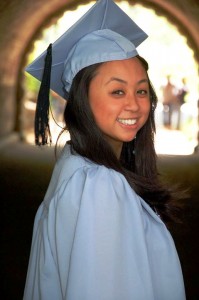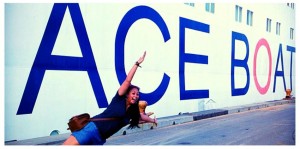JQ Magazine: JQ&A with Trixie Cordova, Peace Boat US Volunteer Staff and World Up Education Director

Trixie’s advice for new JETs: “Soak it in! Challenge yourself to try new things, explore the country, eat crazy foods, GET NAKED (at an onsen, anyway). Appreciate how different and preserved Japanese culture truly is, and don’t take your time abroad for granted. You were a chosen one, so embrace it!” (Courtesy of Trixie Cordova)
By Mark Flanigan (Nagasaki-ken, 2000-04) for JQ magazine. A member of the JET Alumni Association of New York’s board of directors, Mark is a program director at the Japan ICU Foundation in New York City and was also a Rotary Peace Fellow at ICU from 2010-12, during which time he volunteered for a tsunami relief mission in Ishinomaki after the terrible 3/11 tragedy. He can be contacted at mflanigan[at]jicuf.org.
Trixie Cordova (Shimane-ken, 2007-09) began volunteering with Peace Boat US in New York since last October. A civil society and non-profit organization, Peace Boat US works to promote peace, sustainable development, human rights and respect for the environment throughout the United States and the world through educational programs organized in partnership with the Japanese NGO Peace Boat, which carries out its main activities through a chartered passenger ship that travels the world on peace voyages.
At the same time, Cordova has served as education director for World Up, a non-profit organization based in Brooklyn that uses music, specifically hip-hop, and technology education to explore local and global issues affecting youth today. A graduate from Teachers College at Columbia University with a Master’s in International Educational Development, concentrating on Peace Education, Cordova has been quite active in JETAANY as well, serving on a career panel for recently returned JETs this past year. Prior to living and working in New York, she taught English in rural Japan for two years, where she first learned about Peace Boat while on the JET Program.
As a Peace Boat US volunteer, Cordova has been working toward creating opportunities for New York youth to participate in the Music and Art Peace Academy (MAPA) Program on board the ship. This summer, she will work closely with Unique Waters of World Up’s after-school music program “WU School” at the Brooklyn Community Arts and Media High School. Together they will lead music and leadership-based activities to promote cross-cultural understanding and to collaborate on a musical soundtrack to MAPA this summer.
JQ reached out to Cordova recently to ask her more about how her experiences in Japan and the Peace Boat-JET connection has led to this sea change in global education.
Thanks for taking the time to share your story, Trixie! Where and when were you placed on JET? Was it your first time in Japan?
Sure thing! I was an elementary and JHS ALT in Gotsu, Shimane, from 2007-09. Shimane’s claim to fame is that it isn’t famous—check out their unofficial mascot, Yoshida-kun, as proof! It was definitely my first time to Japan—I never studied the language or the culture before setting foot in Tokyo for JET orientation.
What was perhaps the biggest misconception you had about Japan before your experience on JET?
I honestly didn’t have very many preconceived notions about Japan, especially given that my decision to do JET was primarily just focused on moving abroad ANYWHERE, not necessarily because of any romanticized ideas I had about Japanese culture. Having said that, I think the biggest misconception I had about Japan was probably that the entire country had access to high-end technology and modern homes. I quickly realized that while that might be true in places like Tokyo, that was definitely not the case in rural Japan.
How many other JETs were in your town or local area?
In Gotsu, there were three ALTs—two JHS’s (dividing up the 10 elementary schools and four JHS), and one HS. I believe there was also a CIR, but ours was from China, and never really participated in JET-related events from what I can recall.
Gotsu was about 20-25 minutes from Hamada, where even more JETs lived! So we’d often go to visit Hamada, especially for sushi Thursdays at Sushizou!
Sounds great! What would be your advice to the new JETs who have just started the program this season?
Soak it in! Challenge yourself to try new things, explore the country, eat crazy foods, GET NAKED (at an onsen, anyway). Appreciate how different and preserved Japanese culture truly is, and don’t take your time abroad for granted. You were a chosen one, so embrace it!
Also, while some of my closest friends in life are JETs, don’t forget to befriend locals as well. You will come to appreciate and truly consider elderly people as FRIENDS (no, really! Especially if there are few young people that live in your town), so embrace that while you can. Besides, they’ll treat to some of the best and most authentic meals while you’re there.
What key takeaways from the program helped you get the position at Peace Boat, as well as succeed at it?
Obviously, being a JET is a huge advantage because the majority of participants on Peace Boat are Japanese. But I think my other experiences accompanying youth overseas, working with organizations that understand music and arts as a tool for social change, as well as my commitment to diversify who gets to learn/travel/teach abroad all helped me to make meaningful contributions to Peace Boat.
Living and working abroad as a JET is a transformative life experience, and I believe that everyone should have access to opportunities that promote cross-cultural engagement and global learning, which is why I’m so excited about the group of young people we’re traveling with this summer.
That’s awesome. How did you first find out about Peace Boat specifically?
I first heard about Peace Boat from departing JETs in my prefecture. Many were applying to become volunteers on board the ship for an upcoming voyage. Since the Peace Boat departs from Yokohama for each voyage, it was a great next step for a lot of JETs as far as I understood. I wasn’t able to apply for Peace Boat since I moved to New York City to get my master’s at Columbia Teachers College immediately after my time at JET came to an end.
What is the mission of Peace Boat, and how does it differ from other peace or Japan-related NGOs?
Peace Boat’s mission is to create a culture of peace around the world through cross-cultural exchange and experiential learning opportunities. Visiting countries across the globe and facilitating workshops and discussions about ongoing issues affecting diverse communities is an extremely privileged experience, but it’s also one that Peace Boat is increasingly trying to make available to a broader and more diverse population. Everyone should have the chance to interact with new people and in new environments to promote peace, and I think this is what makes Peace Boat so different from other NGOs.
In terms of the JET-Peace Boat nexus, what are some of the aspects of being a JET that would help prepare one for volunteering on Peace Boat?
Your time on JET, as an ALT or CIR, would definitely make you a prime candidate as a Peace Boat volunteer! As the majority of participants on our global voyages are Japanese citizens (both young and old), your experiencing living and working in Japan will help you understand the different cultural nuances that the Japanese are coming from as they visit other countries. Your ability to facilitate that relationship, or to bring to light the differences in habits, lifestyle, beliefs, etc., can make your perspective that much more valuable for all those participating. I’d encourage anyone who is interested to go for it!
What kinds of specific volunteer opportunities are there with Peace Boat in Japan or the U.S., and how would one apply for them?
Peace Boat US and the Japanese NGO Peace Boat are related, of course, but are actually two separate non-profit organizations based in our two respective countries. Another JET alumna, Emilie McGlone (Gunma-ken, 2002-04), who worked for a number of years previously with Peace Boat in Tokyo, leads peace Boat US.
Those interested in Peace Boat US can certainly apply to volunteer or intern with our New York office by helping us increase our outreach to schools and organizations aligned with our mission. We are always looking for interested individuals who want to help us spread the word about Peace Boat so that we increase our visibility here in the U.S.
As we are an NGO with consultative status to the UN, our interns and staff have the opportunity to observe a number of events there firsthand! Those with more time and flexibility are welcome to apply to be a volunteer English or Spanish teacher on board the ship during an upcoming voyage as well! The application process is coordinated directly through the office in Japan.
The ship creates a neutral, mobile space and enables people to engage across borders in dialogue and mutual cooperation at sea, and in the scheduled ports of call. Participants learn about various social, political, environmental, and economic issues through our onboard educational programs and our exposure programs in the countries they visit. Learning directly through people-to-people encounters and grassroots field experiences, we examine the root causes of local and global issues, and nurture compassion, empathy, and responsibility as global citizens.
Additionally, we are currently raising funds through Peace Boat US to bring NYC Youth on board the ship this summer as it passes through Latin America. You guys are all welcome to donate through our website!
Thanks again, Trixie! I hope that many current JETs and alums get connected to Peace Boat!
Sure! We’d love to hear from them! We welcome visitors to our NYC office as well, located right by the United Nations HQ. Please feel free to contact us at: info[at]peaceboat-us.org.
For more information on Peace Boat, visitwww.peaceboat.org/english (Peace Boat Japan) or www.peaceboat-us.org (Peace Boat US).
For more JQ magazine interviews, click here.



Comments are closed.